Human Resource Management Analysis: Four Seasons Hotel in Paris
VerifiedAdded on 2020/02/05
|15
|5889
|51
Report
AI Summary
This report provides an in-depth analysis of the human resource management (HRM) strategies employed by the Four Seasons Hotel, focusing on its expansion into Paris, France. The report begins with an executive summary and introduction, followed by an examination of cultural considerations, particularly the differences between French and Canadian cultures using Hofstede's cultural dimensions. It then delves into the recruitment and selection processes, reward and retention strategies, and performance management and employee relations within the context of the hotel's expansion. The study highlights the importance of adapting HRM practices to the local culture and labor laws. The report concludes with recommendations for the Four Seasons Hotel, offering insights into how to effectively manage its workforce in a new cultural environment, focusing on adapting HRM strategies to the French market. This includes insights into power distance, individualism, uncertainty avoidance, and long-term orientation within the French culture. The report also addresses organisational culture, recruitment methods, and the significance of employee attitudes in the hospitality sector, providing valuable insights for students and professionals in the field.
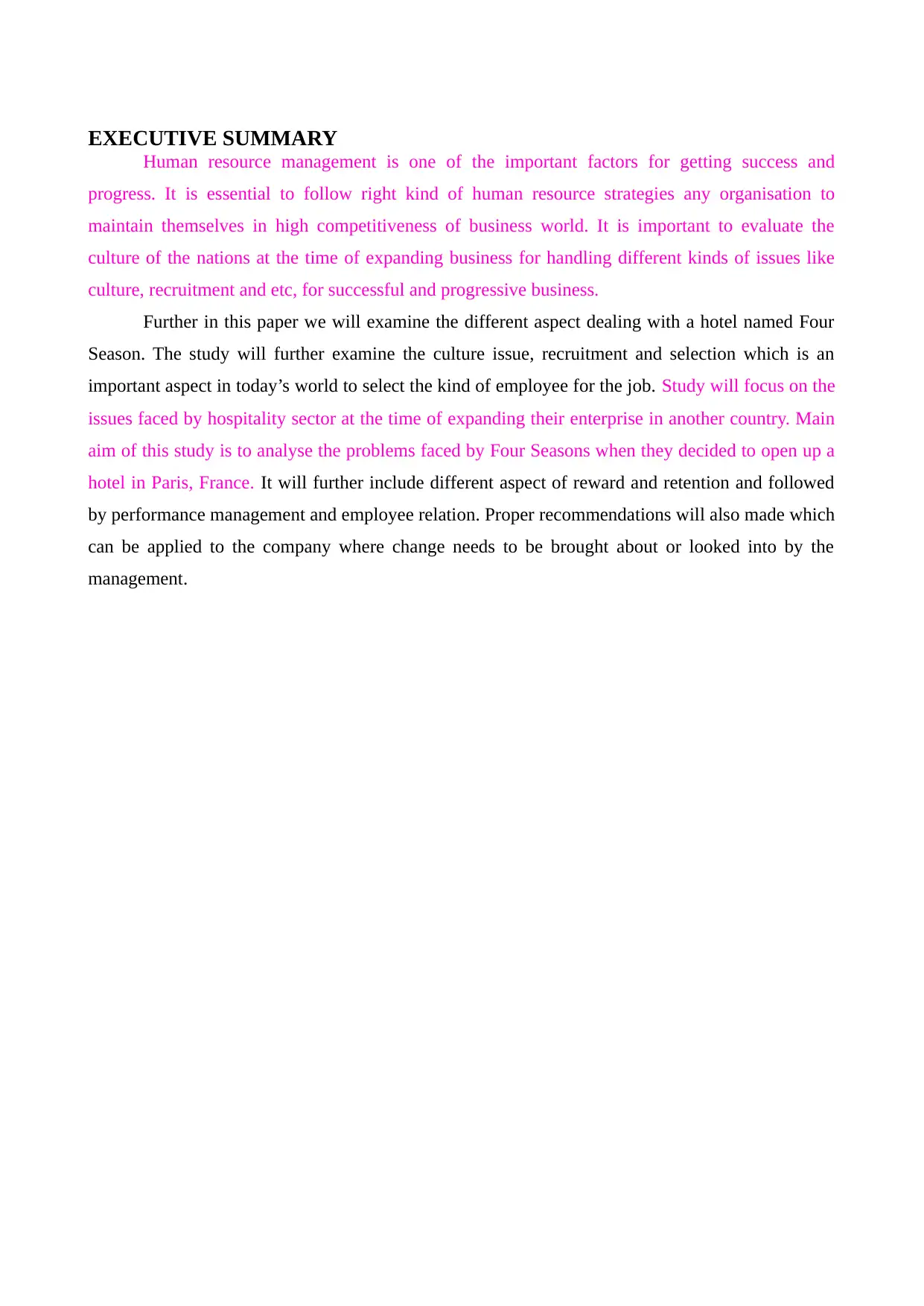
EXECUTIVE SUMMARY
Human resource management is one of the important factors for getting success and
progress. It is essential to follow right kind of human resource strategies any organisation to
maintain themselves in high competitiveness of business world. It is important to evaluate the
culture of the nations at the time of expanding business for handling different kinds of issues like
culture, recruitment and etc, for successful and progressive business.
Further in this paper we will examine the different aspect dealing with a hotel named Four
Season. The study will further examine the culture issue, recruitment and selection which is an
important aspect in today’s world to select the kind of employee for the job. Study will focus on the
issues faced by hospitality sector at the time of expanding their enterprise in another country. Main
aim of this study is to analyse the problems faced by Four Seasons when they decided to open up a
hotel in Paris, France. It will further include different aspect of reward and retention and followed
by performance management and employee relation. Proper recommendations will also made which
can be applied to the company where change needs to be brought about or looked into by the
management.
Human resource management is one of the important factors for getting success and
progress. It is essential to follow right kind of human resource strategies any organisation to
maintain themselves in high competitiveness of business world. It is important to evaluate the
culture of the nations at the time of expanding business for handling different kinds of issues like
culture, recruitment and etc, for successful and progressive business.
Further in this paper we will examine the different aspect dealing with a hotel named Four
Season. The study will further examine the culture issue, recruitment and selection which is an
important aspect in today’s world to select the kind of employee for the job. Study will focus on the
issues faced by hospitality sector at the time of expanding their enterprise in another country. Main
aim of this study is to analyse the problems faced by Four Seasons when they decided to open up a
hotel in Paris, France. It will further include different aspect of reward and retention and followed
by performance management and employee relation. Proper recommendations will also made which
can be applied to the company where change needs to be brought about or looked into by the
management.
Paraphrase This Document
Need a fresh take? Get an instant paraphrase of this document with our AI Paraphraser
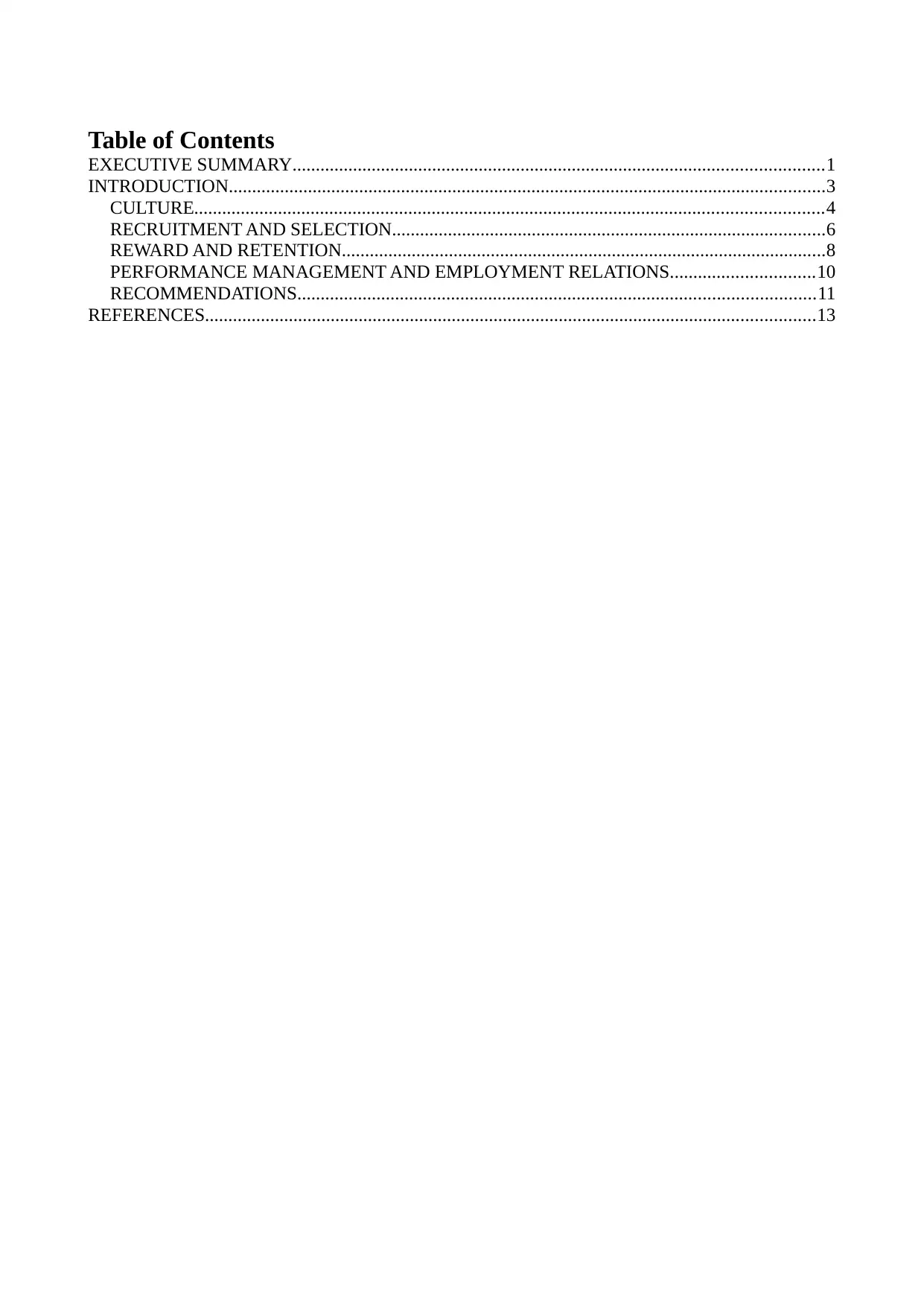
Table of Contents
EXECUTIVE SUMMARY..................................................................................................................1
INTRODUCTION................................................................................................................................3
CULTURE.......................................................................................................................................4
RECRUITMENT AND SELECTION.............................................................................................6
REWARD AND RETENTION........................................................................................................8
PERFORMANCE MANAGEMENT AND EMPLOYMENT RELATIONS...............................10
RECOMMENDATIONS...............................................................................................................11
REFERENCES...................................................................................................................................13
EXECUTIVE SUMMARY..................................................................................................................1
INTRODUCTION................................................................................................................................3
CULTURE.......................................................................................................................................4
RECRUITMENT AND SELECTION.............................................................................................6
REWARD AND RETENTION........................................................................................................8
PERFORMANCE MANAGEMENT AND EMPLOYMENT RELATIONS...............................10
RECOMMENDATIONS...............................................................................................................11
REFERENCES...................................................................................................................................13
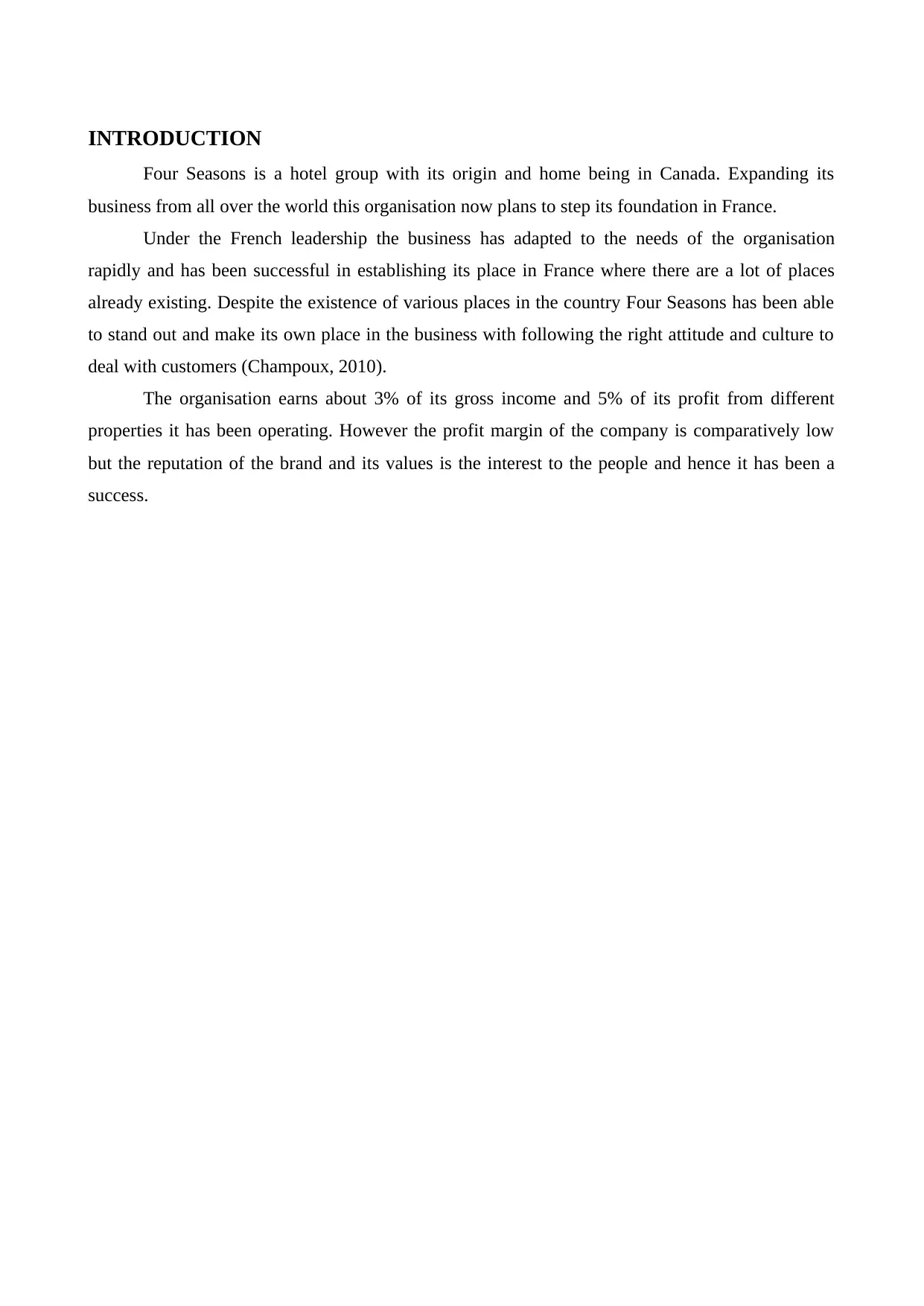
INTRODUCTION
Four Seasons is a hotel group with its origin and home being in Canada. Expanding its
business from all over the world this organisation now plans to step its foundation in France.
Under the French leadership the business has adapted to the needs of the organisation
rapidly and has been successful in establishing its place in France where there are a lot of places
already existing. Despite the existence of various places in the country Four Seasons has been able
to stand out and make its own place in the business with following the right attitude and culture to
deal with customers (Champoux, 2010).
The organisation earns about 3% of its gross income and 5% of its profit from different
properties it has been operating. However the profit margin of the company is comparatively low
but the reputation of the brand and its values is the interest to the people and hence it has been a
success.
Four Seasons is a hotel group with its origin and home being in Canada. Expanding its
business from all over the world this organisation now plans to step its foundation in France.
Under the French leadership the business has adapted to the needs of the organisation
rapidly and has been successful in establishing its place in France where there are a lot of places
already existing. Despite the existence of various places in the country Four Seasons has been able
to stand out and make its own place in the business with following the right attitude and culture to
deal with customers (Champoux, 2010).
The organisation earns about 3% of its gross income and 5% of its profit from different
properties it has been operating. However the profit margin of the company is comparatively low
but the reputation of the brand and its values is the interest to the people and hence it has been a
success.
⊘ This is a preview!⊘
Do you want full access?
Subscribe today to unlock all pages.

Trusted by 1+ million students worldwide
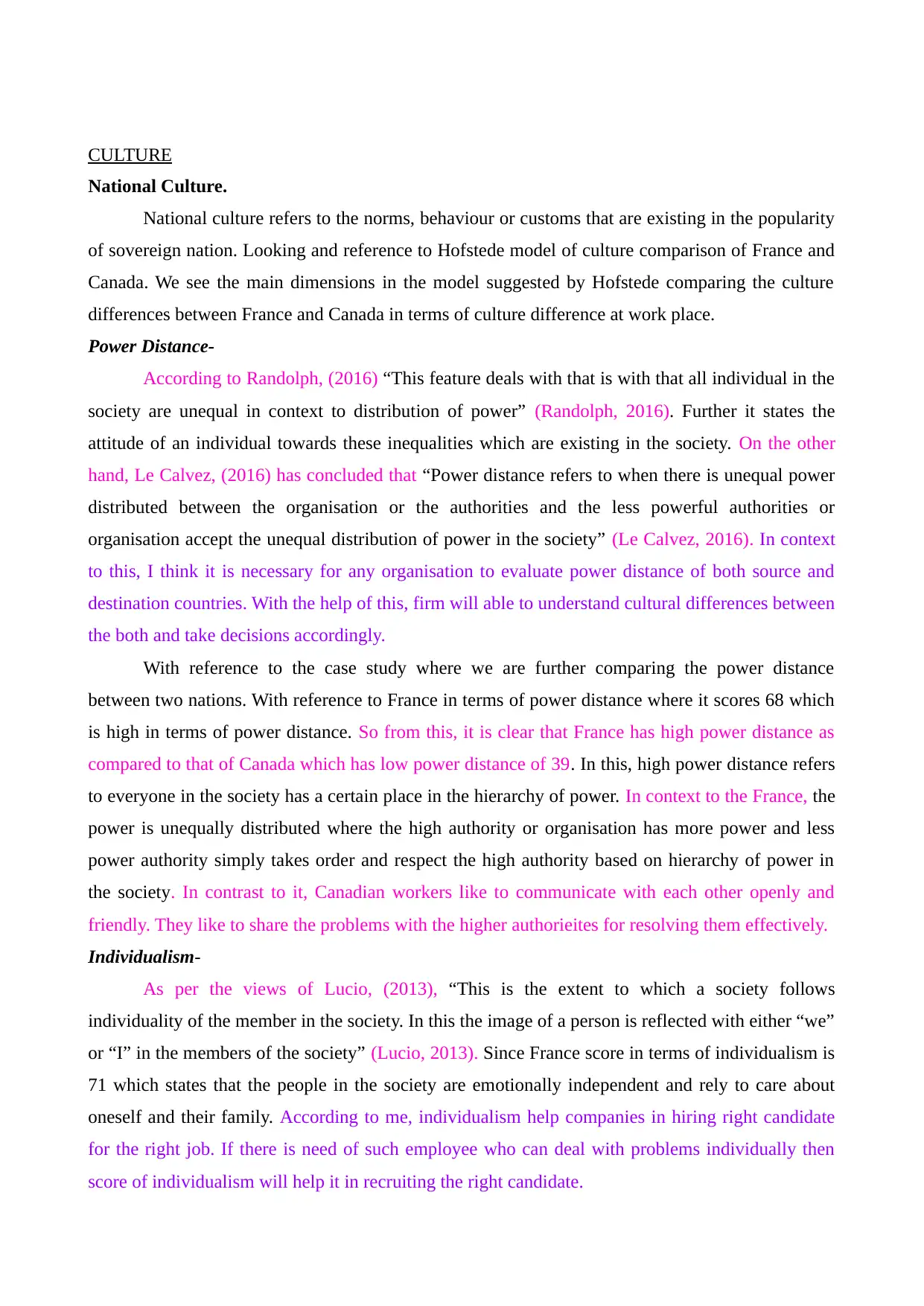
CULTURE
National Culture.
National culture refers to the norms, behaviour or customs that are existing in the popularity
of sovereign nation. Looking and reference to Hofstede model of culture comparison of France and
Canada. We see the main dimensions in the model suggested by Hofstede comparing the culture
differences between France and Canada in terms of culture difference at work place.
Power Distance-
According to Randolph, (2016) “This feature deals with that is with that all individual in the
society are unequal in context to distribution of power” (Randolph, 2016). Further it states the
attitude of an individual towards these inequalities which are existing in the society. On the other
hand, Le Calvez, (2016) has concluded that “Power distance refers to when there is unequal power
distributed between the organisation or the authorities and the less powerful authorities or
organisation accept the unequal distribution of power in the society” (Le Calvez, 2016). In context
to this, I think it is necessary for any organisation to evaluate power distance of both source and
destination countries. With the help of this, firm will able to understand cultural differences between
the both and take decisions accordingly.
With reference to the case study where we are further comparing the power distance
between two nations. With reference to France in terms of power distance where it scores 68 which
is high in terms of power distance. So from this, it is clear that France has high power distance as
compared to that of Canada which has low power distance of 39. In this, high power distance refers
to everyone in the society has a certain place in the hierarchy of power. In context to the France, the
power is unequally distributed where the high authority or organisation has more power and less
power authority simply takes order and respect the high authority based on hierarchy of power in
the society. In contrast to it, Canadian workers like to communicate with each other openly and
friendly. They like to share the problems with the higher authorieites for resolving them effectively.
Individualism-
As per the views of Lucio, (2013), “This is the extent to which a society follows
individuality of the member in the society. In this the image of a person is reflected with either “we”
or “I” in the members of the society” (Lucio, 2013). Since France score in terms of individualism is
71 which states that the people in the society are emotionally independent and rely to care about
oneself and their family. According to me, individualism help companies in hiring right candidate
for the right job. If there is need of such employee who can deal with problems individually then
score of individualism will help it in recruiting the right candidate.
National Culture.
National culture refers to the norms, behaviour or customs that are existing in the popularity
of sovereign nation. Looking and reference to Hofstede model of culture comparison of France and
Canada. We see the main dimensions in the model suggested by Hofstede comparing the culture
differences between France and Canada in terms of culture difference at work place.
Power Distance-
According to Randolph, (2016) “This feature deals with that is with that all individual in the
society are unequal in context to distribution of power” (Randolph, 2016). Further it states the
attitude of an individual towards these inequalities which are existing in the society. On the other
hand, Le Calvez, (2016) has concluded that “Power distance refers to when there is unequal power
distributed between the organisation or the authorities and the less powerful authorities or
organisation accept the unequal distribution of power in the society” (Le Calvez, 2016). In context
to this, I think it is necessary for any organisation to evaluate power distance of both source and
destination countries. With the help of this, firm will able to understand cultural differences between
the both and take decisions accordingly.
With reference to the case study where we are further comparing the power distance
between two nations. With reference to France in terms of power distance where it scores 68 which
is high in terms of power distance. So from this, it is clear that France has high power distance as
compared to that of Canada which has low power distance of 39. In this, high power distance refers
to everyone in the society has a certain place in the hierarchy of power. In context to the France, the
power is unequally distributed where the high authority or organisation has more power and less
power authority simply takes order and respect the high authority based on hierarchy of power in
the society. In contrast to it, Canadian workers like to communicate with each other openly and
friendly. They like to share the problems with the higher authorieites for resolving them effectively.
Individualism-
As per the views of Lucio, (2013), “This is the extent to which a society follows
individuality of the member in the society. In this the image of a person is reflected with either “we”
or “I” in the members of the society” (Lucio, 2013). Since France score in terms of individualism is
71 which states that the people in the society are emotionally independent and rely to care about
oneself and their family. According to me, individualism help companies in hiring right candidate
for the right job. If there is need of such employee who can deal with problems individually then
score of individualism will help it in recruiting the right candidate.
Paraphrase This Document
Need a fresh take? Get an instant paraphrase of this document with our AI Paraphraser
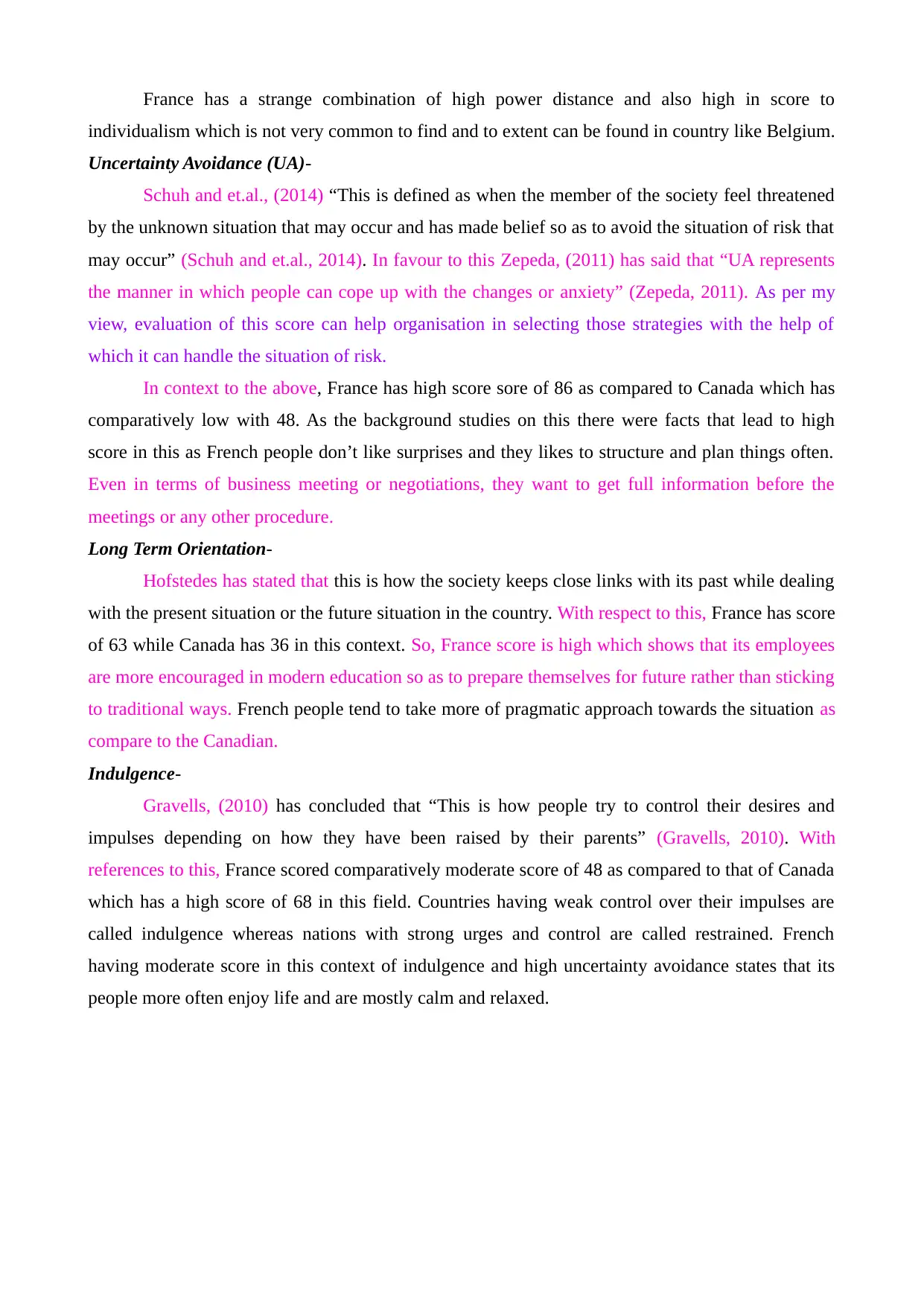
France has a strange combination of high power distance and also high in score to
individualism which is not very common to find and to extent can be found in country like Belgium.
Uncertainty Avoidance (UA)-
Schuh and et.al., (2014) “This is defined as when the member of the society feel threatened
by the unknown situation that may occur and has made belief so as to avoid the situation of risk that
may occur” (Schuh and et.al., 2014). In favour to this Zepeda, (2011) has said that “UA represents
the manner in which people can cope up with the changes or anxiety” (Zepeda, 2011). As per my
view, evaluation of this score can help organisation in selecting those strategies with the help of
which it can handle the situation of risk.
In context to the above, France has high score sore of 86 as compared to Canada which has
comparatively low with 48. As the background studies on this there were facts that lead to high
score in this as French people don’t like surprises and they likes to structure and plan things often.
Even in terms of business meeting or negotiations, they want to get full information before the
meetings or any other procedure.
Long Term Orientation-
Hofstedes has stated that this is how the society keeps close links with its past while dealing
with the present situation or the future situation in the country. With respect to this, France has score
of 63 while Canada has 36 in this context. So, France score is high which shows that its employees
are more encouraged in modern education so as to prepare themselves for future rather than sticking
to traditional ways. French people tend to take more of pragmatic approach towards the situation as
compare to the Canadian.
Indulgence-
Gravells, (2010) has concluded that “This is how people try to control their desires and
impulses depending on how they have been raised by their parents” (Gravells, 2010). With
references to this, France scored comparatively moderate score of 48 as compared to that of Canada
which has a high score of 68 in this field. Countries having weak control over their impulses are
called indulgence whereas nations with strong urges and control are called restrained. French
having moderate score in this context of indulgence and high uncertainty avoidance states that its
people more often enjoy life and are mostly calm and relaxed.
individualism which is not very common to find and to extent can be found in country like Belgium.
Uncertainty Avoidance (UA)-
Schuh and et.al., (2014) “This is defined as when the member of the society feel threatened
by the unknown situation that may occur and has made belief so as to avoid the situation of risk that
may occur” (Schuh and et.al., 2014). In favour to this Zepeda, (2011) has said that “UA represents
the manner in which people can cope up with the changes or anxiety” (Zepeda, 2011). As per my
view, evaluation of this score can help organisation in selecting those strategies with the help of
which it can handle the situation of risk.
In context to the above, France has high score sore of 86 as compared to Canada which has
comparatively low with 48. As the background studies on this there were facts that lead to high
score in this as French people don’t like surprises and they likes to structure and plan things often.
Even in terms of business meeting or negotiations, they want to get full information before the
meetings or any other procedure.
Long Term Orientation-
Hofstedes has stated that this is how the society keeps close links with its past while dealing
with the present situation or the future situation in the country. With respect to this, France has score
of 63 while Canada has 36 in this context. So, France score is high which shows that its employees
are more encouraged in modern education so as to prepare themselves for future rather than sticking
to traditional ways. French people tend to take more of pragmatic approach towards the situation as
compare to the Canadian.
Indulgence-
Gravells, (2010) has concluded that “This is how people try to control their desires and
impulses depending on how they have been raised by their parents” (Gravells, 2010). With
references to this, France scored comparatively moderate score of 48 as compared to that of Canada
which has a high score of 68 in this field. Countries having weak control over their impulses are
called indulgence whereas nations with strong urges and control are called restrained. French
having moderate score in this context of indulgence and high uncertainty avoidance states that its
people more often enjoy life and are mostly calm and relaxed.
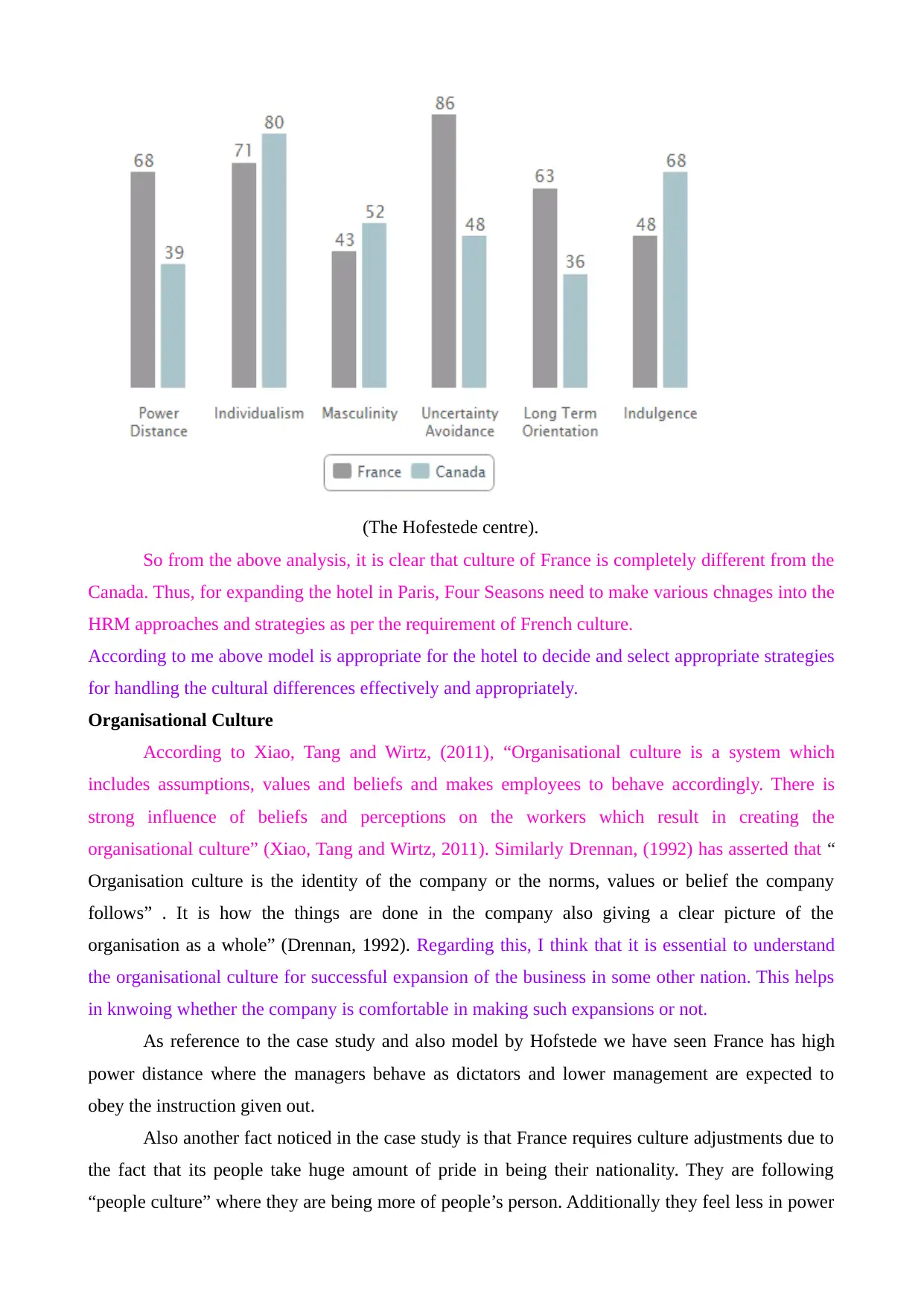
(The Hofestede centre).
So from the above analysis, it is clear that culture of France is completely different from the
Canada. Thus, for expanding the hotel in Paris, Four Seasons need to make various chnages into the
HRM approaches and strategies as per the requirement of French culture.
According to me above model is appropriate for the hotel to decide and select appropriate strategies
for handling the cultural differences effectively and appropriately.
Organisational Culture
According to Xiao, Tang and Wirtz, (2011), “Organisational culture is a system which
includes assumptions, values and beliefs and makes employees to behave accordingly. There is
strong influence of beliefs and perceptions on the workers which result in creating the
organisational culture” (Xiao, Tang and Wirtz, 2011). Similarly Drennan, (1992) has asserted that “
Organisation culture is the identity of the company or the norms, values or belief the company
follows” . It is how the things are done in the company also giving a clear picture of the
organisation as a whole” (Drennan, 1992). Regarding this, I think that it is essential to understand
the organisational culture for successful expansion of the business in some other nation. This helps
in knwoing whether the company is comfortable in making such expansions or not.
As reference to the case study and also model by Hofstede we have seen France has high
power distance where the managers behave as dictators and lower management are expected to
obey the instruction given out.
Also another fact noticed in the case study is that France requires culture adjustments due to
the fact that its people take huge amount of pride in being their nationality. They are following
“people culture” where they are being more of people’s person. Additionally they feel less in power
So from the above analysis, it is clear that culture of France is completely different from the
Canada. Thus, for expanding the hotel in Paris, Four Seasons need to make various chnages into the
HRM approaches and strategies as per the requirement of French culture.
According to me above model is appropriate for the hotel to decide and select appropriate strategies
for handling the cultural differences effectively and appropriately.
Organisational Culture
According to Xiao, Tang and Wirtz, (2011), “Organisational culture is a system which
includes assumptions, values and beliefs and makes employees to behave accordingly. There is
strong influence of beliefs and perceptions on the workers which result in creating the
organisational culture” (Xiao, Tang and Wirtz, 2011). Similarly Drennan, (1992) has asserted that “
Organisation culture is the identity of the company or the norms, values or belief the company
follows” . It is how the things are done in the company also giving a clear picture of the
organisation as a whole” (Drennan, 1992). Regarding this, I think that it is essential to understand
the organisational culture for successful expansion of the business in some other nation. This helps
in knwoing whether the company is comfortable in making such expansions or not.
As reference to the case study and also model by Hofstede we have seen France has high
power distance where the managers behave as dictators and lower management are expected to
obey the instruction given out.
Also another fact noticed in the case study is that France requires culture adjustments due to
the fact that its people take huge amount of pride in being their nationality. They are following
“people culture” where they are being more of people’s person. Additionally they feel less in power
⊘ This is a preview!⊘
Do you want full access?
Subscribe today to unlock all pages.

Trusted by 1+ million students worldwide
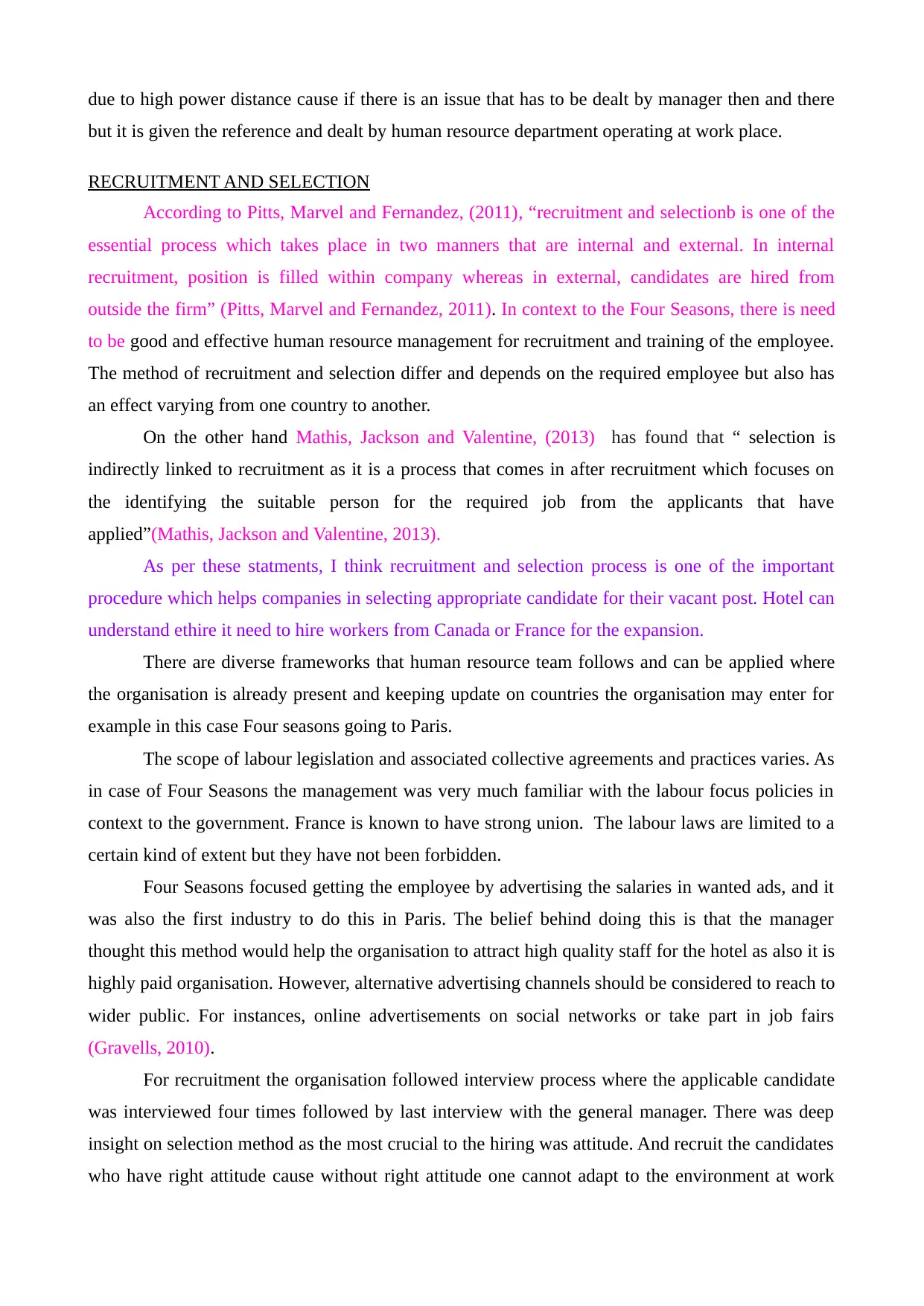
due to high power distance cause if there is an issue that has to be dealt by manager then and there
but it is given the reference and dealt by human resource department operating at work place.
RECRUITMENT AND SELECTION
According to Pitts, Marvel and Fernandez, (2011), “recruitment and selectionb is one of the
essential process which takes place in two manners that are internal and external. In internal
recruitment, position is filled within company whereas in external, candidates are hired from
outside the firm” (Pitts, Marvel and Fernandez, 2011). In context to the Four Seasons, there is need
to be good and effective human resource management for recruitment and training of the employee.
The method of recruitment and selection differ and depends on the required employee but also has
an effect varying from one country to another.
On the other hand Mathis, Jackson and Valentine, (2013) has found that “ selection is
indirectly linked to recruitment as it is a process that comes in after recruitment which focuses on
the identifying the suitable person for the required job from the applicants that have
applied”(Mathis, Jackson and Valentine, 2013).
As per these statments, I think recruitment and selection process is one of the important
procedure which helps companies in selecting appropriate candidate for their vacant post. Hotel can
understand ethire it need to hire workers from Canada or France for the expansion.
There are diverse frameworks that human resource team follows and can be applied where
the organisation is already present and keeping update on countries the organisation may enter for
example in this case Four seasons going to Paris.
The scope of labour legislation and associated collective agreements and practices varies. As
in case of Four Seasons the management was very much familiar with the labour focus policies in
context to the government. France is known to have strong union. The labour laws are limited to a
certain kind of extent but they have not been forbidden.
Four Seasons focused getting the employee by advertising the salaries in wanted ads, and it
was also the first industry to do this in Paris. The belief behind doing this is that the manager
thought this method would help the organisation to attract high quality staff for the hotel as also it is
highly paid organisation. However, alternative advertising channels should be considered to reach to
wider public. For instances, online advertisements on social networks or take part in job fairs
(Gravells, 2010).
For recruitment the organisation followed interview process where the applicable candidate
was interviewed four times followed by last interview with the general manager. There was deep
insight on selection method as the most crucial to the hiring was attitude. And recruit the candidates
who have right attitude cause without right attitude one cannot adapt to the environment at work
but it is given the reference and dealt by human resource department operating at work place.
RECRUITMENT AND SELECTION
According to Pitts, Marvel and Fernandez, (2011), “recruitment and selectionb is one of the
essential process which takes place in two manners that are internal and external. In internal
recruitment, position is filled within company whereas in external, candidates are hired from
outside the firm” (Pitts, Marvel and Fernandez, 2011). In context to the Four Seasons, there is need
to be good and effective human resource management for recruitment and training of the employee.
The method of recruitment and selection differ and depends on the required employee but also has
an effect varying from one country to another.
On the other hand Mathis, Jackson and Valentine, (2013) has found that “ selection is
indirectly linked to recruitment as it is a process that comes in after recruitment which focuses on
the identifying the suitable person for the required job from the applicants that have
applied”(Mathis, Jackson and Valentine, 2013).
As per these statments, I think recruitment and selection process is one of the important
procedure which helps companies in selecting appropriate candidate for their vacant post. Hotel can
understand ethire it need to hire workers from Canada or France for the expansion.
There are diverse frameworks that human resource team follows and can be applied where
the organisation is already present and keeping update on countries the organisation may enter for
example in this case Four seasons going to Paris.
The scope of labour legislation and associated collective agreements and practices varies. As
in case of Four Seasons the management was very much familiar with the labour focus policies in
context to the government. France is known to have strong union. The labour laws are limited to a
certain kind of extent but they have not been forbidden.
Four Seasons focused getting the employee by advertising the salaries in wanted ads, and it
was also the first industry to do this in Paris. The belief behind doing this is that the manager
thought this method would help the organisation to attract high quality staff for the hotel as also it is
highly paid organisation. However, alternative advertising channels should be considered to reach to
wider public. For instances, online advertisements on social networks or take part in job fairs
(Gravells, 2010).
For recruitment the organisation followed interview process where the applicable candidate
was interviewed four times followed by last interview with the general manager. There was deep
insight on selection method as the most crucial to the hiring was attitude. And recruit the candidates
who have right attitude cause without right attitude one cannot adapt to the environment at work
Paraphrase This Document
Need a fresh take? Get an instant paraphrase of this document with our AI Paraphraser
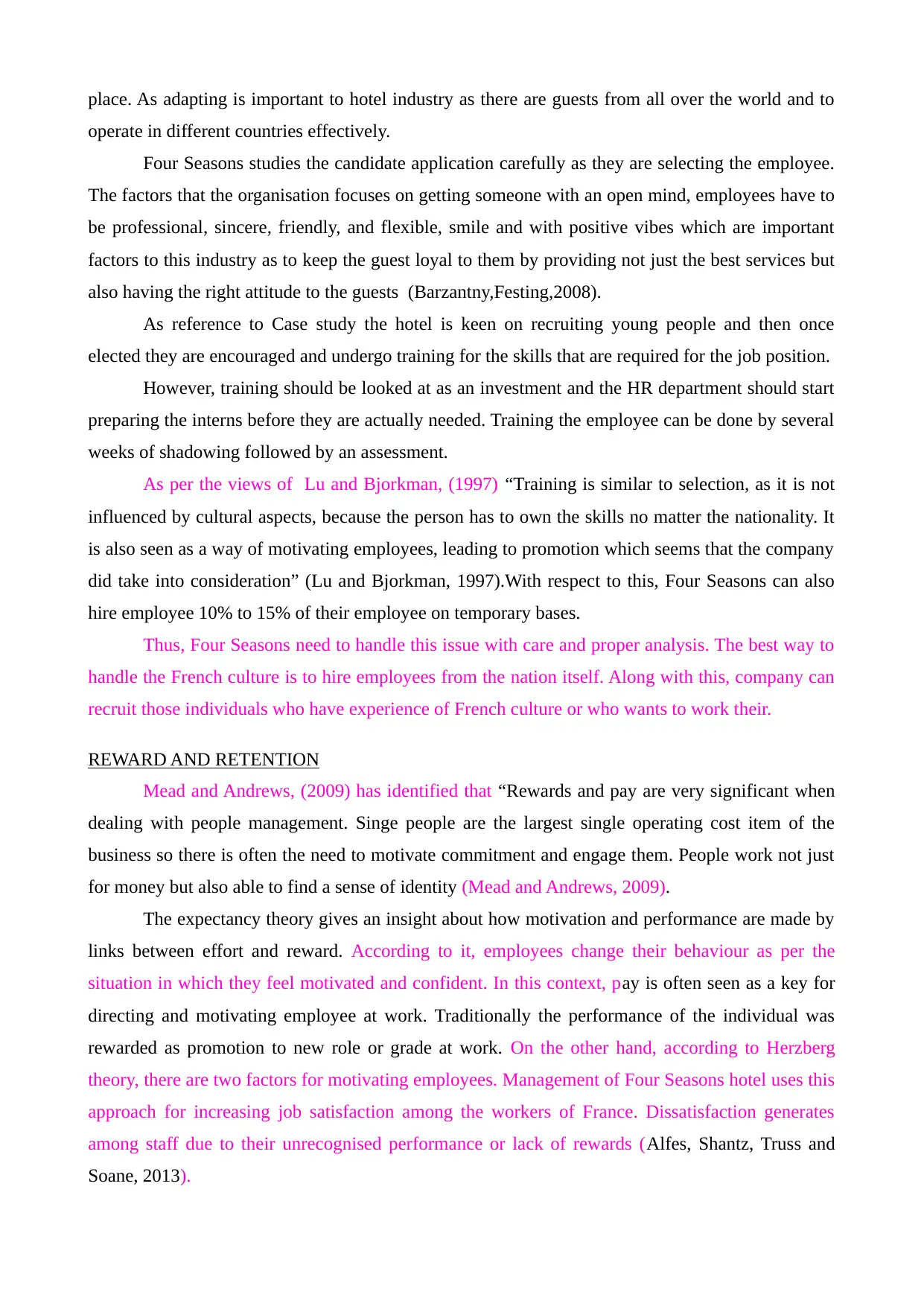
place. As adapting is important to hotel industry as there are guests from all over the world and to
operate in different countries effectively.
Four Seasons studies the candidate application carefully as they are selecting the employee.
The factors that the organisation focuses on getting someone with an open mind, employees have to
be professional, sincere, friendly, and flexible, smile and with positive vibes which are important
factors to this industry as to keep the guest loyal to them by providing not just the best services but
also having the right attitude to the guests (Barzantny,Festing,2008).
As reference to Case study the hotel is keen on recruiting young people and then once
elected they are encouraged and undergo training for the skills that are required for the job position.
However, training should be looked at as an investment and the HR department should start
preparing the interns before they are actually needed. Training the employee can be done by several
weeks of shadowing followed by an assessment.
As per the views of Lu and Bjorkman, (1997) “Training is similar to selection, as it is not
influenced by cultural aspects, because the person has to own the skills no matter the nationality. It
is also seen as a way of motivating employees, leading to promotion which seems that the company
did take into consideration” (Lu and Bjorkman, 1997).With respect to this, Four Seasons can also
hire employee 10% to 15% of their employee on temporary bases.
Thus, Four Seasons need to handle this issue with care and proper analysis. The best way to
handle the French culture is to hire employees from the nation itself. Along with this, company can
recruit those individuals who have experience of French culture or who wants to work their.
REWARD AND RETENTION
Mead and Andrews, (2009) has identified that “Rewards and pay are very significant when
dealing with people management. Singe people are the largest single operating cost item of the
business so there is often the need to motivate commitment and engage them. People work not just
for money but also able to find a sense of identity (Mead and Andrews, 2009).
The expectancy theory gives an insight about how motivation and performance are made by
links between effort and reward. According to it, employees change their behaviour as per the
situation in which they feel motivated and confident. In this context, pay is often seen as a key for
directing and motivating employee at work. Traditionally the performance of the individual was
rewarded as promotion to new role or grade at work. On the other hand, according to Herzberg
theory, there are two factors for motivating employees. Management of Four Seasons hotel uses this
approach for increasing job satisfaction among the workers of France. Dissatisfaction generates
among staff due to their unrecognised performance or lack of rewards (Alfes, Shantz, Truss and
Soane, 2013).
operate in different countries effectively.
Four Seasons studies the candidate application carefully as they are selecting the employee.
The factors that the organisation focuses on getting someone with an open mind, employees have to
be professional, sincere, friendly, and flexible, smile and with positive vibes which are important
factors to this industry as to keep the guest loyal to them by providing not just the best services but
also having the right attitude to the guests (Barzantny,Festing,2008).
As reference to Case study the hotel is keen on recruiting young people and then once
elected they are encouraged and undergo training for the skills that are required for the job position.
However, training should be looked at as an investment and the HR department should start
preparing the interns before they are actually needed. Training the employee can be done by several
weeks of shadowing followed by an assessment.
As per the views of Lu and Bjorkman, (1997) “Training is similar to selection, as it is not
influenced by cultural aspects, because the person has to own the skills no matter the nationality. It
is also seen as a way of motivating employees, leading to promotion which seems that the company
did take into consideration” (Lu and Bjorkman, 1997).With respect to this, Four Seasons can also
hire employee 10% to 15% of their employee on temporary bases.
Thus, Four Seasons need to handle this issue with care and proper analysis. The best way to
handle the French culture is to hire employees from the nation itself. Along with this, company can
recruit those individuals who have experience of French culture or who wants to work their.
REWARD AND RETENTION
Mead and Andrews, (2009) has identified that “Rewards and pay are very significant when
dealing with people management. Singe people are the largest single operating cost item of the
business so there is often the need to motivate commitment and engage them. People work not just
for money but also able to find a sense of identity (Mead and Andrews, 2009).
The expectancy theory gives an insight about how motivation and performance are made by
links between effort and reward. According to it, employees change their behaviour as per the
situation in which they feel motivated and confident. In this context, pay is often seen as a key for
directing and motivating employee at work. Traditionally the performance of the individual was
rewarded as promotion to new role or grade at work. On the other hand, according to Herzberg
theory, there are two factors for motivating employees. Management of Four Seasons hotel uses this
approach for increasing job satisfaction among the workers of France. Dissatisfaction generates
among staff due to their unrecognised performance or lack of rewards (Alfes, Shantz, Truss and
Soane, 2013).
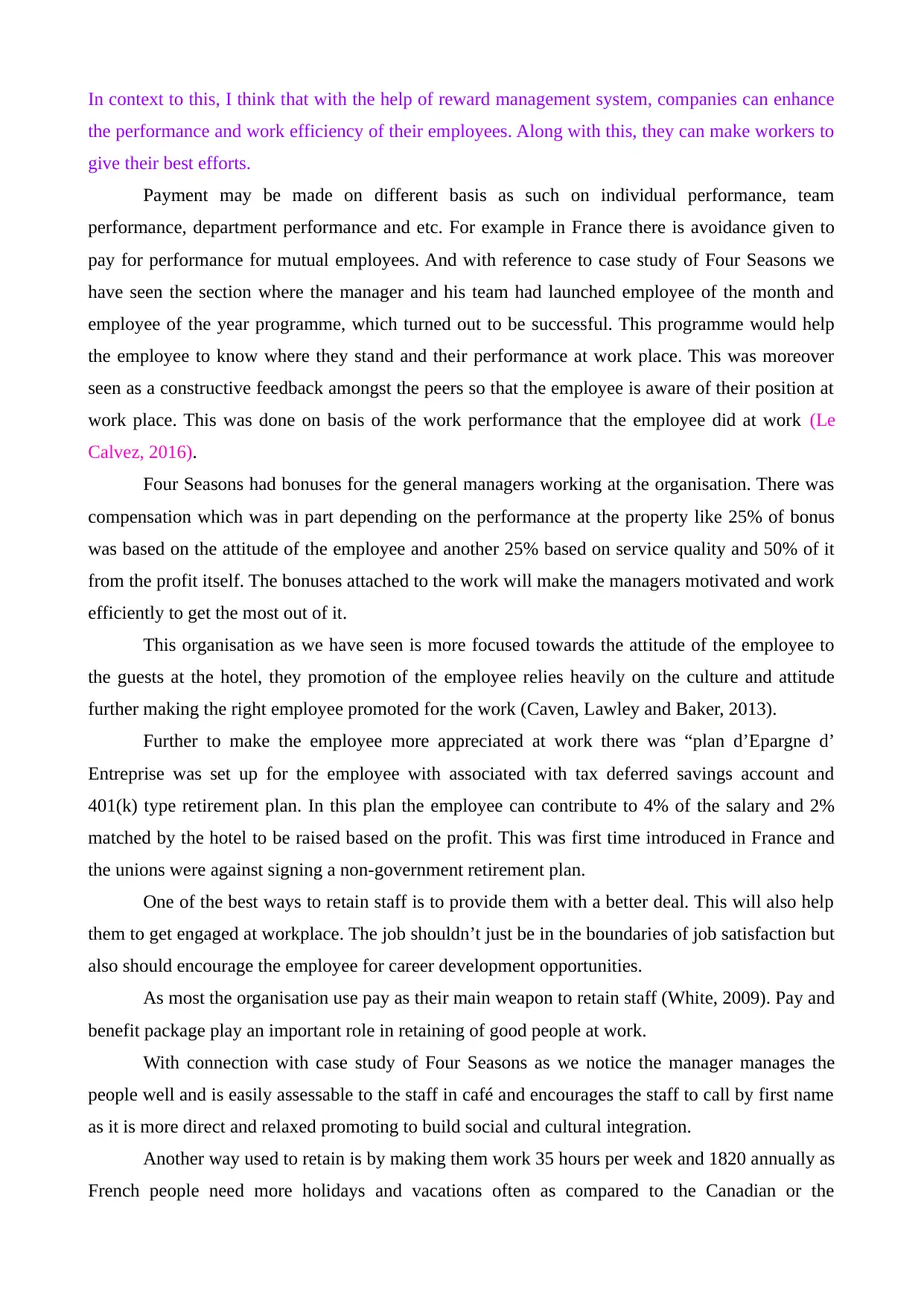
In context to this, I think that with the help of reward management system, companies can enhance
the performance and work efficiency of their employees. Along with this, they can make workers to
give their best efforts.
Payment may be made on different basis as such on individual performance, team
performance, department performance and etc. For example in France there is avoidance given to
pay for performance for mutual employees. And with reference to case study of Four Seasons we
have seen the section where the manager and his team had launched employee of the month and
employee of the year programme, which turned out to be successful. This programme would help
the employee to know where they stand and their performance at work place. This was moreover
seen as a constructive feedback amongst the peers so that the employee is aware of their position at
work place. This was done on basis of the work performance that the employee did at work (Le
Calvez, 2016).
Four Seasons had bonuses for the general managers working at the organisation. There was
compensation which was in part depending on the performance at the property like 25% of bonus
was based on the attitude of the employee and another 25% based on service quality and 50% of it
from the profit itself. The bonuses attached to the work will make the managers motivated and work
efficiently to get the most out of it.
This organisation as we have seen is more focused towards the attitude of the employee to
the guests at the hotel, they promotion of the employee relies heavily on the culture and attitude
further making the right employee promoted for the work (Caven, Lawley and Baker, 2013).
Further to make the employee more appreciated at work there was “plan d’Epargne d’
Entreprise was set up for the employee with associated with tax deferred savings account and
401(k) type retirement plan. In this plan the employee can contribute to 4% of the salary and 2%
matched by the hotel to be raised based on the profit. This was first time introduced in France and
the unions were against signing a non-government retirement plan.
One of the best ways to retain staff is to provide them with a better deal. This will also help
them to get engaged at workplace. The job shouldn’t just be in the boundaries of job satisfaction but
also should encourage the employee for career development opportunities.
As most the organisation use pay as their main weapon to retain staff (White, 2009). Pay and
benefit package play an important role in retaining of good people at work.
With connection with case study of Four Seasons as we notice the manager manages the
people well and is easily assessable to the staff in café and encourages the staff to call by first name
as it is more direct and relaxed promoting to build social and cultural integration.
Another way used to retain is by making them work 35 hours per week and 1820 annually as
French people need more holidays and vacations often as compared to the Canadian or the
the performance and work efficiency of their employees. Along with this, they can make workers to
give their best efforts.
Payment may be made on different basis as such on individual performance, team
performance, department performance and etc. For example in France there is avoidance given to
pay for performance for mutual employees. And with reference to case study of Four Seasons we
have seen the section where the manager and his team had launched employee of the month and
employee of the year programme, which turned out to be successful. This programme would help
the employee to know where they stand and their performance at work place. This was moreover
seen as a constructive feedback amongst the peers so that the employee is aware of their position at
work place. This was done on basis of the work performance that the employee did at work (Le
Calvez, 2016).
Four Seasons had bonuses for the general managers working at the organisation. There was
compensation which was in part depending on the performance at the property like 25% of bonus
was based on the attitude of the employee and another 25% based on service quality and 50% of it
from the profit itself. The bonuses attached to the work will make the managers motivated and work
efficiently to get the most out of it.
This organisation as we have seen is more focused towards the attitude of the employee to
the guests at the hotel, they promotion of the employee relies heavily on the culture and attitude
further making the right employee promoted for the work (Caven, Lawley and Baker, 2013).
Further to make the employee more appreciated at work there was “plan d’Epargne d’
Entreprise was set up for the employee with associated with tax deferred savings account and
401(k) type retirement plan. In this plan the employee can contribute to 4% of the salary and 2%
matched by the hotel to be raised based on the profit. This was first time introduced in France and
the unions were against signing a non-government retirement plan.
One of the best ways to retain staff is to provide them with a better deal. This will also help
them to get engaged at workplace. The job shouldn’t just be in the boundaries of job satisfaction but
also should encourage the employee for career development opportunities.
As most the organisation use pay as their main weapon to retain staff (White, 2009). Pay and
benefit package play an important role in retaining of good people at work.
With connection with case study of Four Seasons as we notice the manager manages the
people well and is easily assessable to the staff in café and encourages the staff to call by first name
as it is more direct and relaxed promoting to build social and cultural integration.
Another way used to retain is by making them work 35 hours per week and 1820 annually as
French people need more holidays and vacations often as compared to the Canadian or the
⊘ This is a preview!⊘
Do you want full access?
Subscribe today to unlock all pages.

Trusted by 1+ million students worldwide
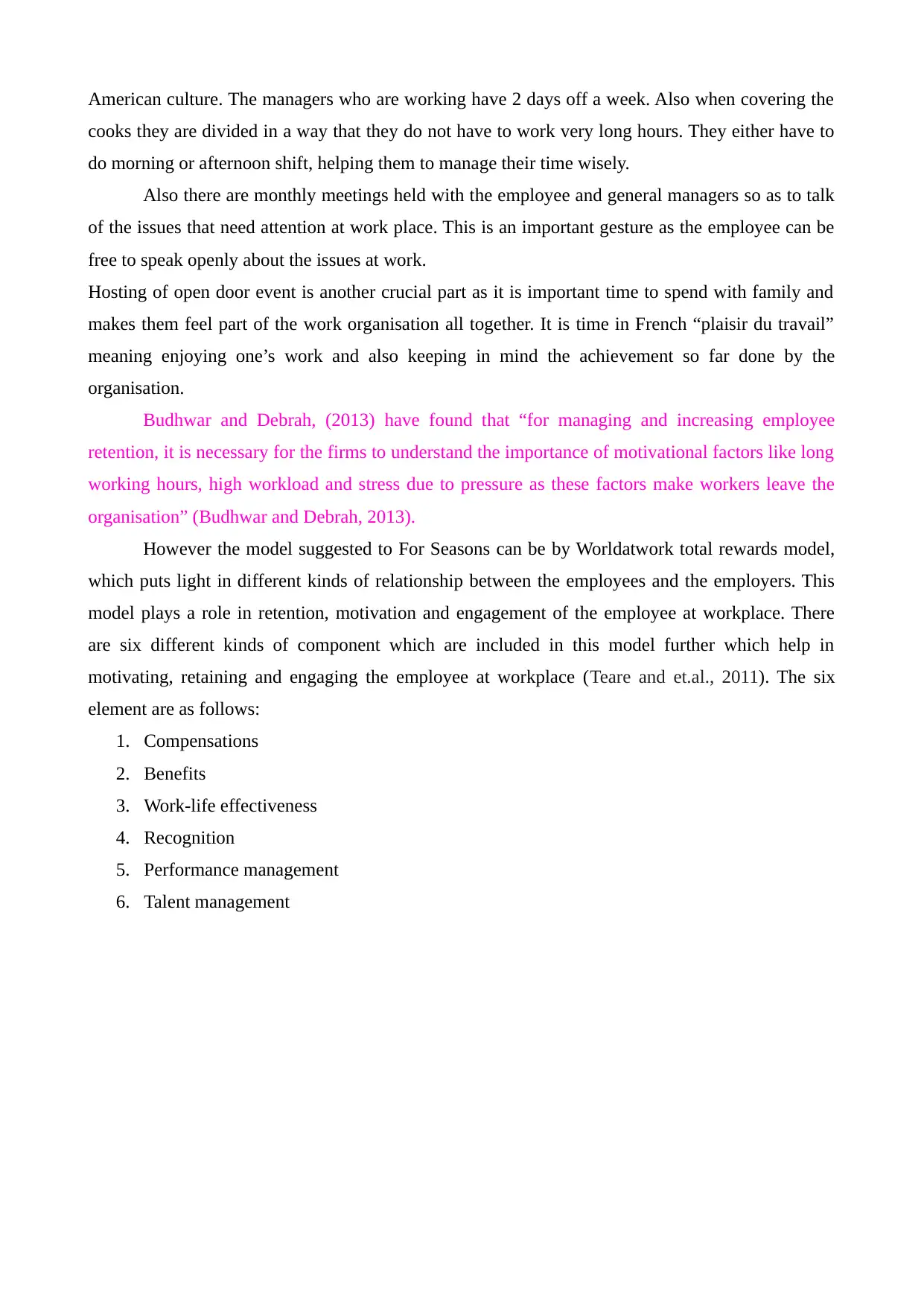
American culture. The managers who are working have 2 days off a week. Also when covering the
cooks they are divided in a way that they do not have to work very long hours. They either have to
do morning or afternoon shift, helping them to manage their time wisely.
Also there are monthly meetings held with the employee and general managers so as to talk
of the issues that need attention at work place. This is an important gesture as the employee can be
free to speak openly about the issues at work.
Hosting of open door event is another crucial part as it is important time to spend with family and
makes them feel part of the work organisation all together. It is time in French “plaisir du travail”
meaning enjoying one’s work and also keeping in mind the achievement so far done by the
organisation.
Budhwar and Debrah, (2013) have found that “for managing and increasing employee
retention, it is necessary for the firms to understand the importance of motivational factors like long
working hours, high workload and stress due to pressure as these factors make workers leave the
organisation” (Budhwar and Debrah, 2013).
However the model suggested to For Seasons can be by Worldatwork total rewards model,
which puts light in different kinds of relationship between the employees and the employers. This
model plays a role in retention, motivation and engagement of the employee at workplace. There
are six different kinds of component which are included in this model further which help in
motivating, retaining and engaging the employee at workplace (Teare and et.al., 2011). The six
element are as follows:
1. Compensations
2. Benefits
3. Work-life effectiveness
4. Recognition
5. Performance management
6. Talent management
cooks they are divided in a way that they do not have to work very long hours. They either have to
do morning or afternoon shift, helping them to manage their time wisely.
Also there are monthly meetings held with the employee and general managers so as to talk
of the issues that need attention at work place. This is an important gesture as the employee can be
free to speak openly about the issues at work.
Hosting of open door event is another crucial part as it is important time to spend with family and
makes them feel part of the work organisation all together. It is time in French “plaisir du travail”
meaning enjoying one’s work and also keeping in mind the achievement so far done by the
organisation.
Budhwar and Debrah, (2013) have found that “for managing and increasing employee
retention, it is necessary for the firms to understand the importance of motivational factors like long
working hours, high workload and stress due to pressure as these factors make workers leave the
organisation” (Budhwar and Debrah, 2013).
However the model suggested to For Seasons can be by Worldatwork total rewards model,
which puts light in different kinds of relationship between the employees and the employers. This
model plays a role in retention, motivation and engagement of the employee at workplace. There
are six different kinds of component which are included in this model further which help in
motivating, retaining and engaging the employee at workplace (Teare and et.al., 2011). The six
element are as follows:
1. Compensations
2. Benefits
3. Work-life effectiveness
4. Recognition
5. Performance management
6. Talent management
Paraphrase This Document
Need a fresh take? Get an instant paraphrase of this document with our AI Paraphraser
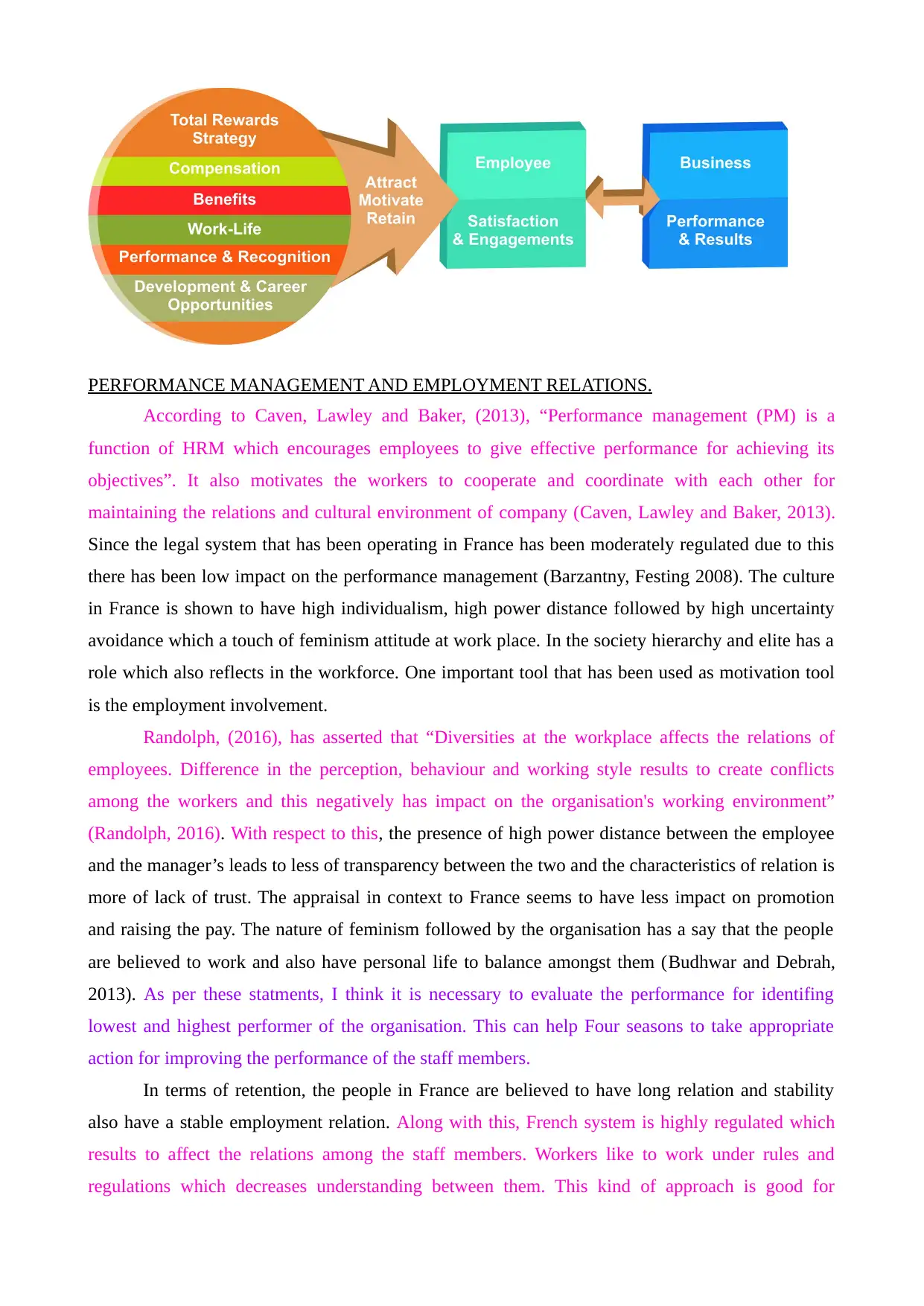
PERFORMANCE MANAGEMENT AND EMPLOYMENT RELATIONS.
According to Caven, Lawley and Baker, (2013), “Performance management (PM) is a
function of HRM which encourages employees to give effective performance for achieving its
objectives”. It also motivates the workers to cooperate and coordinate with each other for
maintaining the relations and cultural environment of company (Caven, Lawley and Baker, 2013).
Since the legal system that has been operating in France has been moderately regulated due to this
there has been low impact on the performance management (Barzantny, Festing 2008). The culture
in France is shown to have high individualism, high power distance followed by high uncertainty
avoidance which a touch of feminism attitude at work place. In the society hierarchy and elite has a
role which also reflects in the workforce. One important tool that has been used as motivation tool
is the employment involvement.
Randolph, (2016), has asserted that “Diversities at the workplace affects the relations of
employees. Difference in the perception, behaviour and working style results to create conflicts
among the workers and this negatively has impact on the organisation's working environment”
(Randolph, 2016). With respect to this, the presence of high power distance between the employee
and the manager’s leads to less of transparency between the two and the characteristics of relation is
more of lack of trust. The appraisal in context to France seems to have less impact on promotion
and raising the pay. The nature of feminism followed by the organisation has a say that the people
are believed to work and also have personal life to balance amongst them (Budhwar and Debrah,
2013). As per these statments, I think it is necessary to evaluate the performance for identifing
lowest and highest performer of the organisation. This can help Four seasons to take appropriate
action for improving the performance of the staff members.
In terms of retention, the people in France are believed to have long relation and stability
also have a stable employment relation. Along with this, French system is highly regulated which
results to affect the relations among the staff members. Workers like to work under rules and
regulations which decreases understanding between them. This kind of approach is good for
According to Caven, Lawley and Baker, (2013), “Performance management (PM) is a
function of HRM which encourages employees to give effective performance for achieving its
objectives”. It also motivates the workers to cooperate and coordinate with each other for
maintaining the relations and cultural environment of company (Caven, Lawley and Baker, 2013).
Since the legal system that has been operating in France has been moderately regulated due to this
there has been low impact on the performance management (Barzantny, Festing 2008). The culture
in France is shown to have high individualism, high power distance followed by high uncertainty
avoidance which a touch of feminism attitude at work place. In the society hierarchy and elite has a
role which also reflects in the workforce. One important tool that has been used as motivation tool
is the employment involvement.
Randolph, (2016), has asserted that “Diversities at the workplace affects the relations of
employees. Difference in the perception, behaviour and working style results to create conflicts
among the workers and this negatively has impact on the organisation's working environment”
(Randolph, 2016). With respect to this, the presence of high power distance between the employee
and the manager’s leads to less of transparency between the two and the characteristics of relation is
more of lack of trust. The appraisal in context to France seems to have less impact on promotion
and raising the pay. The nature of feminism followed by the organisation has a say that the people
are believed to work and also have personal life to balance amongst them (Budhwar and Debrah,
2013). As per these statments, I think it is necessary to evaluate the performance for identifing
lowest and highest performer of the organisation. This can help Four seasons to take appropriate
action for improving the performance of the staff members.
In terms of retention, the people in France are believed to have long relation and stability
also have a stable employment relation. Along with this, French system is highly regulated which
results to affect the relations among the staff members. Workers like to work under rules and
regulations which decreases understanding between them. This kind of approach is good for
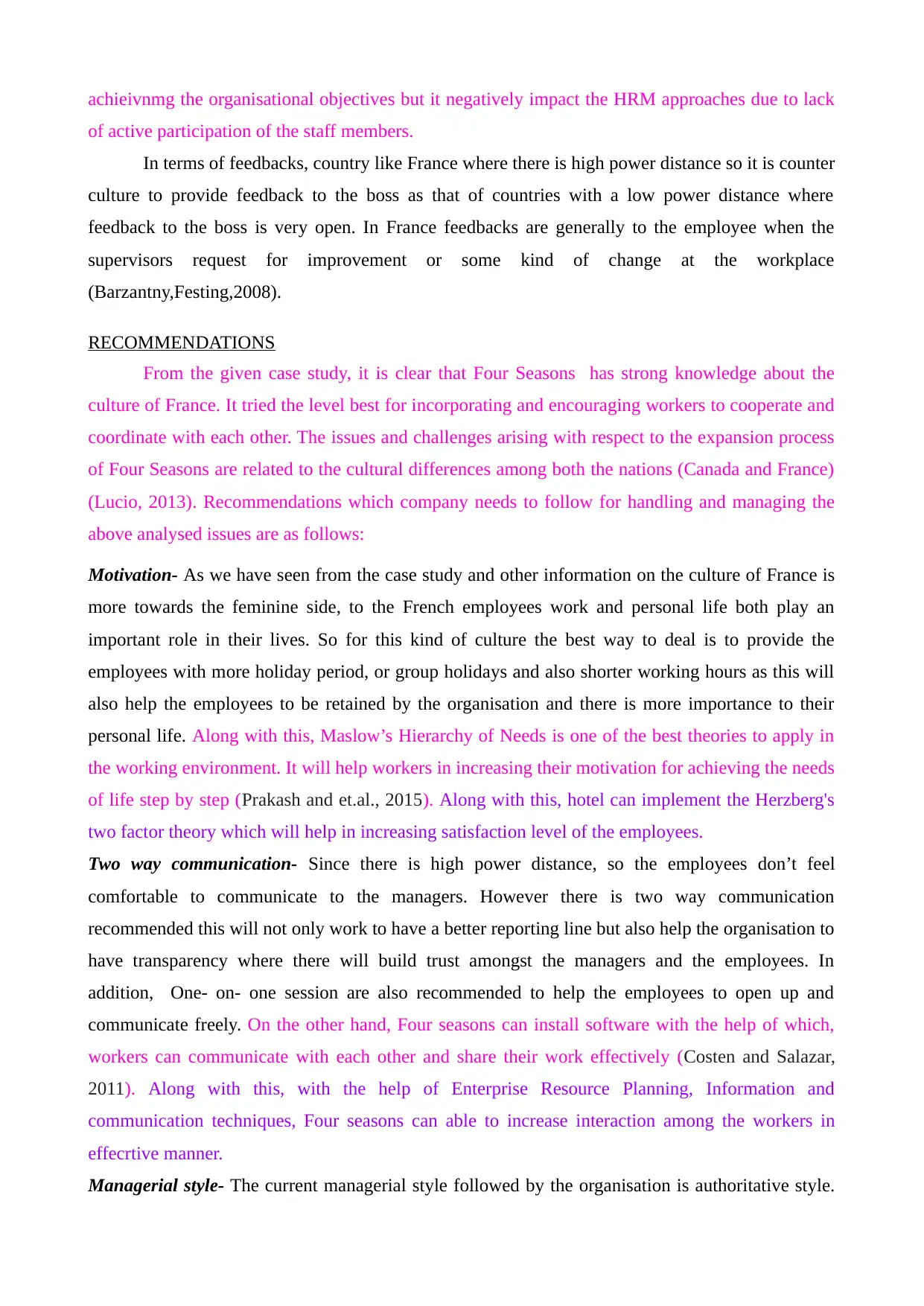
achieivnmg the organisational objectives but it negatively impact the HRM approaches due to lack
of active participation of the staff members.
In terms of feedbacks, country like France where there is high power distance so it is counter
culture to provide feedback to the boss as that of countries with a low power distance where
feedback to the boss is very open. In France feedbacks are generally to the employee when the
supervisors request for improvement or some kind of change at the workplace
(Barzantny,Festing,2008).
RECOMMENDATIONS
From the given case study, it is clear that Four Seasons has strong knowledge about the
culture of France. It tried the level best for incorporating and encouraging workers to cooperate and
coordinate with each other. The issues and challenges arising with respect to the expansion process
of Four Seasons are related to the cultural differences among both the nations (Canada and France)
(Lucio, 2013). Recommendations which company needs to follow for handling and managing the
above analysed issues are as follows:
Motivation- As we have seen from the case study and other information on the culture of France is
more towards the feminine side, to the French employees work and personal life both play an
important role in their lives. So for this kind of culture the best way to deal is to provide the
employees with more holiday period, or group holidays and also shorter working hours as this will
also help the employees to be retained by the organisation and there is more importance to their
personal life. Along with this, Maslow’s Hierarchy of Needs is one of the best theories to apply in
the working environment. It will help workers in increasing their motivation for achieving the needs
of life step by step (Prakash and et.al., 2015). Along with this, hotel can implement the Herzberg's
two factor theory which will help in increasing satisfaction level of the employees.
Two way communication- Since there is high power distance, so the employees don’t feel
comfortable to communicate to the managers. However there is two way communication
recommended this will not only work to have a better reporting line but also help the organisation to
have transparency where there will build trust amongst the managers and the employees. In
addition, One- on- one session are also recommended to help the employees to open up and
communicate freely. On the other hand, Four seasons can install software with the help of which,
workers can communicate with each other and share their work effectively (Costen and Salazar,
2011). Along with this, with the help of Enterprise Resource Planning, Information and
communication techniques, Four seasons can able to increase interaction among the workers in
effecrtive manner.
Managerial style- The current managerial style followed by the organisation is authoritative style.
of active participation of the staff members.
In terms of feedbacks, country like France where there is high power distance so it is counter
culture to provide feedback to the boss as that of countries with a low power distance where
feedback to the boss is very open. In France feedbacks are generally to the employee when the
supervisors request for improvement or some kind of change at the workplace
(Barzantny,Festing,2008).
RECOMMENDATIONS
From the given case study, it is clear that Four Seasons has strong knowledge about the
culture of France. It tried the level best for incorporating and encouraging workers to cooperate and
coordinate with each other. The issues and challenges arising with respect to the expansion process
of Four Seasons are related to the cultural differences among both the nations (Canada and France)
(Lucio, 2013). Recommendations which company needs to follow for handling and managing the
above analysed issues are as follows:
Motivation- As we have seen from the case study and other information on the culture of France is
more towards the feminine side, to the French employees work and personal life both play an
important role in their lives. So for this kind of culture the best way to deal is to provide the
employees with more holiday period, or group holidays and also shorter working hours as this will
also help the employees to be retained by the organisation and there is more importance to their
personal life. Along with this, Maslow’s Hierarchy of Needs is one of the best theories to apply in
the working environment. It will help workers in increasing their motivation for achieving the needs
of life step by step (Prakash and et.al., 2015). Along with this, hotel can implement the Herzberg's
two factor theory which will help in increasing satisfaction level of the employees.
Two way communication- Since there is high power distance, so the employees don’t feel
comfortable to communicate to the managers. However there is two way communication
recommended this will not only work to have a better reporting line but also help the organisation to
have transparency where there will build trust amongst the managers and the employees. In
addition, One- on- one session are also recommended to help the employees to open up and
communicate freely. On the other hand, Four seasons can install software with the help of which,
workers can communicate with each other and share their work effectively (Costen and Salazar,
2011). Along with this, with the help of Enterprise Resource Planning, Information and
communication techniques, Four seasons can able to increase interaction among the workers in
effecrtive manner.
Managerial style- The current managerial style followed by the organisation is authoritative style.
⊘ This is a preview!⊘
Do you want full access?
Subscribe today to unlock all pages.

Trusted by 1+ million students worldwide
1 out of 15
Related Documents
Your All-in-One AI-Powered Toolkit for Academic Success.
+13062052269
info@desklib.com
Available 24*7 on WhatsApp / Email
![[object Object]](/_next/static/media/star-bottom.7253800d.svg)
Unlock your academic potential
Copyright © 2020–2026 A2Z Services. All Rights Reserved. Developed and managed by ZUCOL.




